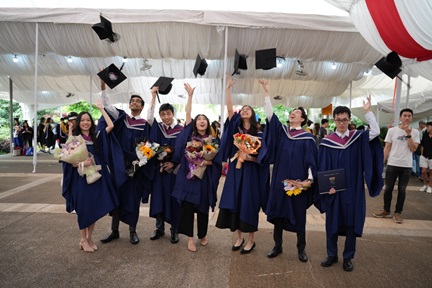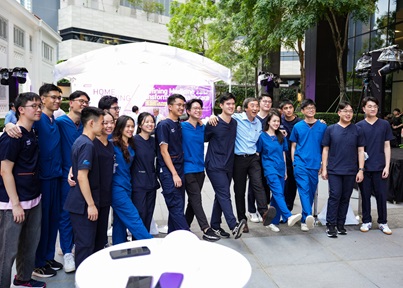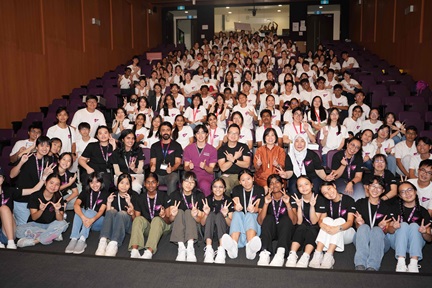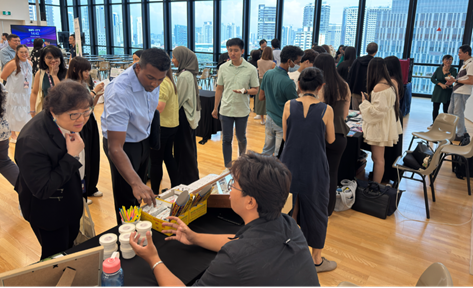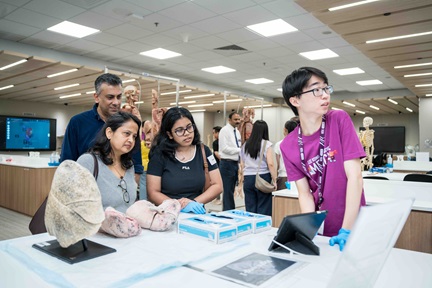Training a new kind of doctor
Just over six months ago, LKCMedicine's very first graduates started work in hospitals across Singapore. That milestone moment was an eagerly awaited one, not just by the School, but also by the many educators at LKCMedicine's primary clinical training partner, the National Healthcare Group (NHG).
"I was filled with anticipation as I really wanted to see whether the things we tried to do differently came to fruition," said Associate Professor Nicholas Chew, NHG's Group Chief Education Officer.
From the outset when LKCMedicine worked with Imperial and NHG to first conceptualise the curriculum, all parties were determined to train a workforce that would approach patient care in a sustainable and relationship-based manner rather than approach care from an episodic or hospital-centric perspective. In other words, doctors who would understand how to care for patients with long-term chronic needs, and not just acute injuries or disease flare-ups.
Recalling those early discussions, Professor Lim Tock Han, NHG's Deputy Group CEO for Education & Research, said in an interview last year, "We were pleasantly surprised that we were speaking the same language as our Imperial College colleagues about the goals of medical education."
"We talked about how the curriculum can be better organised in order to give medical students a solid learning structure in the form of an integrated curriculum, that is, the basic science knowledge is not delinked from clinical teaching," he added.
And this has become a hallmark of LKCMedicine's education, and one that is already bearing fruit, according to A/Prof Chew. Having clinicians interact with students even during the preclinical years and relating the scientific principles to clinical applications has provided these young doctors with a strong foundation in the scientific basis of medicine.
"Without that scientific knowledge base, it is very hard to solve [complex] problems, and that is where the early integration between scientific basis and clinical practice is important to us," said A/Prof Chew.
The feedback has been positive on this score. Residents and consultants with the Department of General Medicine at Tan Tock Seng Hospital (TTSH) highlight LKCMedicine graduates' ability to synthesise information, make rational decisions and propose reasonable care plans among their distinguishing features.
The School's novel teaching approach which focuses on learning in teams is also paying off with the young doctors adapting well to working in multidisciplinary healthcare teams and earning praise for their softer skills.
Another key innovation in curriculum design that NHG was closely involved in was the students' early exposure to primary care. This starts within the first two months of medical school when Year 1 students spend a week in a Polyclinic to better understand patients' needs on the frontline of healthcare.
This is built upon in Year 2 when students are introduced to care for older adults, learning about the scientific processes that underpin ageing and the implications these have for individuals and society. A placement with geriatric medicine in Year 4 helps to augment this segment of their training.
"The real-life clinical experience allows students to develop competencies that will enable them to deliver the appropriate care to a heterogeneous group of older persons, ranging from those who are fit and healthy to those who are frail and ill," said Associate Professor Wong Wei Chin, Senior Consultant in Geriatric Medicine at Tan Tock Seng Hospital and LKCMedicine Subject Lead for Geriatric Medicine.
To see the full pay-off of these efforts will require a little more patience, A/Prof Chew said.
A total that is greater than the sum of its parts
Training a new generation of doctors who are equipped to care for patients' changing needs is not the only benefit NHG reaped from this journey. The Group has long been renowned for the quality of its teaching, attracting some of the best teachers in healthcare.
"We're altruistic, we want to teach and we're passionate about that. However, at that time (during the setup of the school), our methods, concept and philosophy around teaching were not substantially informed," said Prof Lim.
That realisation combined with the momentum brought on by the need for teachers not only for the medical school but also the design of the residency programmes spurred the development of the cluster's faculty development programmes.
With this growing demand for teachers from all healthcare professions, NHG's education movement took a leap both in terms of scope and standard, something that would not have been thought of just 10 years ago. To date, more than 1,000 healthcare professionals have been involved in curriculum development and training at LKCMedicine alone.
"The number of faculty at all levels is much higher, including nursing and the allied health professionals, expanding beyond what was initially just a medical education and residency initiative. It has become a truly inter-professional education movement," said A/Prof Chew, who also holds an adjunct appointment with the School.
Teaching scores from medical, nursing and allied health students are testimony to the effectiveness of this effort, showing a continued upward trend in students' feedback scores.
"We put that down to the fact that we have elevated education capabilities in the institution, raising the bar across the board," said A/Prof Chew.



